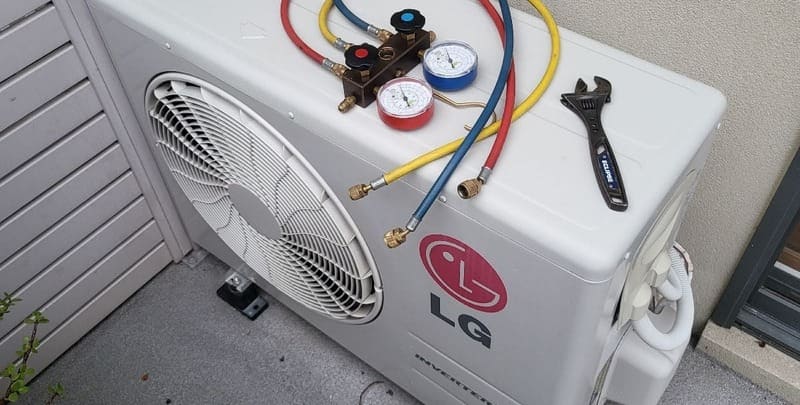
Why is My Air Conditioner Not Turning On?
When your air conditioner stops working, it transforms from a source of cool air (or warm air) to a major problem, especially on a day when you need it most.
Numerous issues can prevent the air conditioning unit from initiating a full cooling cycle, ranging from a tripped circuit breaker in the electrical panel to a dirty air filter blocking the flow of air.
The heart of the system, the thermostat, may have a faulty setting or require a simple reset to resume blowing air. In some cases, the outdoor unit might suffer from a refrigerant leak or a frozen evaporator coil, hindering the AC’s ability to produce cold air. Identifying the root cause, whether it’s a power supply issue, a full condensate drain pan, or a malfunctioning fan motor, is crucial.
Regular cleaning and maintenance can prevent many common air conditioner problems, ensuring the system works properly to maintain the desired temperature in your home.
Common Causes of an AC Not Turning On
Several factors can prevent an air conditioner from turning on, often leaving you in the uncomfortable warmth of your home.
- Tripped circuit breaker or blown fuse: These are among the most common reasons for an air conditioner not turning on. This can be found in your electrical switchboard. This safety switch can interrupt power to the air conditioning unit, requiring a simple reset to restore functionality.
- Faulty thermostat: This is another usual suspect. If it’s not set to the correct temperature or is malfunctioning, it won’t signal the air conditioning system to start the cooling cycle. Most air conditioners rely on this integral part to gauge the indoor air temperature and commence operation.
- Clogged air filters: Blocked air filters can also lead to AC problems, restricting airflow and causing the unit to shut off as a protective measure against overheating. Similarly, issues in the condensate drain line, like water leaking or a full ac drain pan, can activate the float switch, halting the system to prevent water damage.
- Dirty evaporator coils or a malfunctioning compressor: These problems can hinder the air conditioner’s ability to produce cold air. Furthermore, if the air conditioning system’s condensate pump is not working properly, it can cause leaking water, triggering the safety switch and preventing the AC from running.
- Power outage: Clearly, if you’ve lost power, your air conditioner will not work.
Regular inspection by a heating, ventilation and air conditioning (HVAC) professional can identify and resolve these issues, ensuring your air conditioning units stay cool and operational when you most need them.

Inspecting the Air Conditioning Unit
A thorough inspection of your air conditioner can unveil a myriad of issues preventing it from executing a successful cooling cycle. Begin by checking the breaker box; a tripped switch could be a simple fix to restore power to the unit. Examine the air filter next; a clogged filter restricts airflow, leading to warm air output or causing the ac unit to shut off prematurely.
Listen for strange noises when the ac system attempts to run, as these can indicate mechanical problems within the compressor or other internal components. Additionally, inspect the drain line for blockages or leaks, which can trigger the shut-off switch, halting the air conditioner’s operation.
Ensure the thermostat is set to the correct current setting and functioning properly, as it governs the air con’s ability to produce cold air. Many air conditioners also have a reset button, which can sometimes rectify minor electrical issues and get the system running again.
An HVAC pro can provide a more in-depth examination, particularly for complex components like the compressor or other parts of the HVAC system, to ensure that your air conditioning unit works efficiently and consistently provides relief from the heat.
Electrical Issues and the Air Conditioner
Electrical issues are among the chief reasons an air conditioner may fail to initiate a cooling cycle, affecting its ability to provide co air and counter the heat. When the ac unit doesn’t turn on, one of the first things to investigate is the power supply to the unit.
A tripped circuit breaker or a blown fuse can prevent the air conditioner from receiving the electricity it needs to operate.
Wiring problems within the air con can also lead to malfunctions. Over time, wires can become loose, corroded, or damaged, interrupting the flow of electricity to the ac unit and hindering its performance. This can result in the air conditioner intermittently turning on and off or failing to start altogether.
The thermostat plays a pivotal role in the electrical functioning of the air conditioning system. If it is not properly calibrated or is malfunctioning, it may not signal the ac to start the cooling cycle, leading to a lack of cooled air.
Regular inspections and maintenance are crucial to ensure that these electrical components are in good working order and that the air conditioner works efficiently to maintain a comfortable indoor temperature.
Professional Maintenance of Air Conditioning Systems
Regular professional maintenance is vital to ensure your air conditioner remains reliable, especially when you need cooled air during hot weather. A certified technician can perform a comprehensive inspection to identify and rectify issues, from a tripped circuit breaker to a malfunctioning thermostat, which can prevent the air con from completing its cooling cycle.
During a maintenance visit, the technician will check electrical connections to resolve any electrical issues that could hinder the ac from running efficiently. They’ll inspect the thermostat to ensure it accurately communicates with the air conditioner, facilitating the transition between hot and cooled air seamlessly.
Professionals also examine the internal components of the ac unit, including motors and coils, to ensure they are free from damage and functioning correctly. This preventative approach helps to avert common problems that might cause the air conditioner to turn off unexpectedly or fail to start.
Regularly scheduled maintenance not only addresses the immediate operational needs of the air conditioner but also prolongs its lifespan and improves energy efficiency, ensuring that your system delivers consistent and effective cooling throughout its service life.

When to Call the Experts
Navigating between DIY fixes and professional help for air conditioner issues requires understanding the complexity and risks involved. Simple tasks like replacing a dirty air filter or resetting a tripped circuit breaker can often be handled without expert intervention.
However, when it comes to more intricate problems such as refrigerant leaks, electrical faults, or issues with the compressor, professional expertise becomes indispensable.
Professionals bring the necessary tools, skills, and knowledge to diagnose and resolve air conditioning problems efficiently and safely. Attempting to fix complex issues without the proper training can lead to further damage, void warranties, and even pose safety risks.
Moreover, HVAC technicians can provide preventative maintenance, ensuring your system operates optimally and helping to avoid future breakdowns.
In summary, while minor ac issues can be managed at home, for reliable and lasting solutions, especially when the air conditioner stops running efficiently or exhibits unusual symptoms, calling the experts is the prudent choice.
Ensuring Reliable AC Performance
Troubleshooting an air conditioner that won’t turn on involves examining various potential culprits, from electrical issues like a tripped circuit breaker to mechanical problems within the ac unit itself.
Regular maintenance and timely intervention can prevent common problems, ensuring the system efficiently produces cooled air when needed. Understanding the signs of potential issues, such as strange noises, warm air output, or frequent cycling, is crucial.
When in doubt, consulting with a professional HVAC technician can save time and prevent further damage to the air conditioning system.
Ultimately, the key to a reliable air conditioner lies in proactive care and immediate response to any signs of malfunction, ensuring a comfortable indoor environment regardless of the outdoor temperature.
Please note: This information is provided for advice purposes only. Regulations differ from state to state, so please consult your local authorities or an industry professional before proceeding with any work. See our Terms & Conditions here.
Published: 9 April 2024